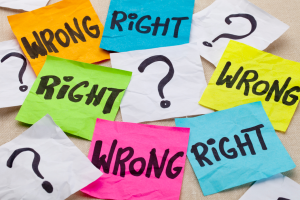
Credit: Body Love Wellnes
Every day, many times a day, we get the message that fat is bad and unhealthy and that weight loss generally is healthy.
It’s tempting to believe these messages because they’re so ubiquitous. And for many people, especially ones who don’t have “weight problems”, it’s tempting to point out the many ways in which fat is bad, immoral, unhealthy, and costly.
Often, the people who reiterate “fat is bad” statements do so from a place of alleged concern. They may say things like, “I understand that you love your body, but don’t you see that fat is unhealthy?”
This is called concern trolling — worrying about someone health and weight in a way that says they can’t be trusted to make decisions about their own bodies.
This is an insidious practice, and one that reinforces ideas about fat that are, honestly, untrue. So I’d like to present you with some “fat facts” here.
Myth 1. Fat is unhealthy.
Fat is not inherently unhealthy. In fact, being underweight, in many ways, is more dangerous than being overweight, obese, or morbidly obese.
Furthermore, a great deal of evidence suggests that health problems linked to fat are actually a result of dieting, and the incredible strain that dieting puts on the body.
A recent study found that people who lost 15% or more of their body weight had an increased risk of death compared to people of the same size who didn’t lose weight.
In addition, fat people live longer than thin people and are more likely to survive cardiac events and not suffer as much blood lossdue to treatments such as angioplasty.
Fat has even been shown to protect against a variety of problems, including “infections, cancer, lung disease, heart disease, osteoporosis, anemia, high blood pressure, rheumatoid arthritis and type 2 diabetes.” Fat people also have lower rates of emphysema, chronic obstructive pulmonary disease, hip fracture, tuberculosis, anemia, peptic ulcer and chronic bronchitis.
If you’re wondering why you’ve never heard any of this before, that’s because this information doesn’t make anyone money.
It doesn’t support the $63 billion a year diet industry nor the multi-billion dollar weight loss surgery industry nor the multi-bajillion dollar pharmaceutical industry.
Myth 2. Fat people all have eating disorders, eat poorly, and don’t exercise.
No study has ever supported this conclusion. And let’s just get clear on something.
You cannot tell anything about a person’s eating habits or fitness level or relative health from their size.
I have 300-pound clients who eat all organic, whole foods and train for triathlons, and I have 120-pound clients who are generally sedentary and have binge eating disorder.
People of all different sizes have all different habits, and a quick surveyof your friends and relatives will show just that.
Myth 3. If fat people would eat properly and exercise, they wouldn’t be fat.
Contrary to popular opinion, people come in all shapes and sizes. Just like people are short and tall and in between, people are fat and thin and in between.
It’s called diversity. It’s called genetics.
It’s called, in some instances, the result of constant dieting.
Myth 4. Weight loss is a healthy goal, deserving of promotion.
Not true at all. First of all, diets don’t work. They really don’t. The one or two people that you know that lost weight on a diet and kept it off for more than 5 years are statistical freaks.
Dieting wreaks havoc on the body, affecting everything from your immune system, to your cardiovascular system, to your stamina and mental health, to your stress levels, to your body image.
Oh, and don’t get me started on the incredible dangerousness of weight loss surgeries.
If anyone tells you that their plan promises long-term weight loss, they are lying to you.
If they promise weight loss and fail to mention whether it will be long-term or not, they are deceiving you.
Myth 5. Promoting fat acceptance makes people fat.
No studies have ever shownthat approving and loving your body causes one to gain weight. In fact, Health At Every Size practices, which include body acceptance, actually make people healthier.
When you can show me that shaming people about their bodies improves health, then we can talk.
And by the way, the way we shame fat people has led to an exponential rise in discrimination against people in the workplace, health care and education.
Myth 6. There’s an obesity crisis going on and obesity is on the rise.
Actually, it’s not. Also, see item 1, above.
Myth 7. Childhood obesity is a serious problem.
Actually, it’s not. Childhood life expectancy continues to rise. And every attempt to make kids thinner has failed.
And, you might want to follow the money behind Michelle Obama’s obesity initiative to see how corporations are benefiting from the b.s.
The real danger for fat children is the threat of bullying and the toll that that takes.
Finally, access to healthy, organic food and safe places to play are important for all children, not just fat ones.
Myth 8. BMI is an appropriate and scientific way of determining health.
If you consider the way BMI works for more than a minute, you realize that it so flawed as to be completely useless.
Myth 9. But all of this goes against the conventional wisdom that fat is bad and deadly!
Your “conventional wisdom” has been paid for by the diet industry and pharmaceutical companies for decades and decades.
It’s time to get over it and start thinking critically.
I encourage you to read Everyday Feminism, Body Love Wellness, and other fantastic fat acceptance blogsand begin the process of unraveling your internalized and externalized hatred.
Additional Recommended Reading:
- The Obesity Myth: Why America’s Obsession With Weight Is Hazardous To Your Health, by Paul Campos
- Losing It: False Hopes & Fat Profits In The Diet Industry, by Laura Fraser
- Fat!So?: Because You Don’t Have To Apologize For Your Size, by Marilyn Wann
- Lessons From The Fat-O-Sphere: Quit Dieting And Declare A Truce With Your Body, by Kate Harding& Marianne Kirby
- Health At Every Size: The Surprising Truth About Your Weight, by Linda Bacon, PhD
- Stop Dieting Now: 25 Reasons To Stop, 25 Ways To Heal, by Golda Poretsky, H.H.C.
Now that we’re clear that fat isn’t a societal scourge and intentional weight loss is a terrible idea, how might your attitude toward fat and health be different?
Originally posted on Body Love Wellness and cross-posted here with their permission.
Golda Poretsky is a Contributing Writer for Everyday Feminism. She’s a certified holistic health counselor and founder of Body Love Wellness, a program designed for plus-sized women who are fed up with dieting and want support to stop obsessing about food and weight. To learn more about Golda and her work, go to www.bodylovewellness.com. Follow her on Twitter at @bodylovewellnes.
Search our 3000+ articles!
Read our articles about:
Our online racial justice training
Used by hundreds of universities, non-profits, and businesses.
Click to learn more




















